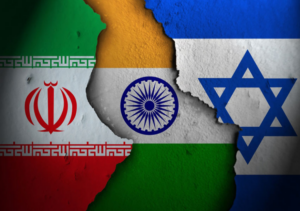GS 2 – International Relations

Context:
The ongoing hostilities between Iran and Israel are intensifying, though the immediate economic impact on India remains moderate. However, short-term fluctuations in oil prices and trade dynamics are possible.
Military Operations Involved:
- Israel – Operation Rising Lion:
Conducted aerial and drone-based strikes targeting Iranian military and nuclear infrastructure to stall its nuclear weapon development. - Iran – Operation True Promise 3:
Launched retaliatory missile attacks on Israeli cities like Jerusalem and Tel Aviv, resulting in explosions and heightened regional tensions.
Core Drivers of the Conflict:
- Ideological Rift Post-1979:
Iran’s stance towards Israel shifted drastically after the Islamic Revolution, leading to antagonism rooted in political and religious ideology. - Nuclear Proliferation Concerns:
Iran’s uranium enrichment at 60% and stalled JCPOA negotiations raise serious security alarms for Israel, which views this as a potential existential threat. - Proxy Engagements:
Iran’s support for groups such as Hezbollah and Hamas fuels instability and intensifies its indirect conflict with Israel. - Regional Power Struggle:
The two countries support rival factions in regional hotspots like Syria, Iraq, and Yemen, vying for influence in West Asia. - Aggressive Rhetoric:
Statements from Iran calling for Israel’s destruction provoke preemptive actions and sustain deep-seated hostility.
Impacts on India:
- Energy Security Risks:
- India sources over 2 million barrels per day through the Strait of Hormuz, a strategic chokepoint that could be affected by military tensions.
- Any disruption can lead to:
- Oil supply shortages
- Spiking global prices (already surged by 8%)
- Increased inflation and fiscal burden
- Rising shipping insurance and freight costs
- Oil Import Costs:
- India imports nearly 80% of its oil demand, and though direct imports from Iran are limited, indirect effects via global pricing are substantial.
- Alternate shipping via the Cape of Good Hope could delay deliveries by 15–20 days and increase container charges by 40–50%.
- Strategic Connectivity Projects at Risk:
- Initiatives like:
- Chabahar Port
- India-Middle East-Europe Corridor (IMEC)
- International North-South Transport Corridor (INSTC)
may face implementation delays, funding obstacles, and disruptions in planned routes.
- Diaspora Concerns:
- Around 66% of the 1.34 crore Indians overseas reside in West Asia, especially in the UAE, Saudi Arabia, and Qatar.
- Escalating conflict may jeopardize their safety and potentially require emergency evacuation efforts.
- Investment Shift to Gold:
- Rising geopolitical uncertainty has driven up gold prices (crossing ₹1 lakh per 10g), as investors seek safer assets amid inflation fears.
Suggested Way Forward for India:
- Support a Two-State Solution:
Endorse a peaceful settlement of the Israel-Palestine issue to lay the foundation for regional peace. - Promote Diplomatic Engagement:
Back efforts by the UN and EU to mediate between Israel and Iran, aiming to reduce nuclear tensions and prevent further escalation. - Revive JCPOA Negotiations:
Encourage Iran’s return to the nuclear agreement under IAEA supervision, while dissuading unilateral military interventions. - Strengthen Regional Dialogue:
Facilitate inclusive dialogue through multilateral platforms like the Gulf Cooperation Council (GCC) and Arab League, bringing both rivals into cooperative frameworks.




